
The Coasters biography
Date of birth : -
Date of death : -
Birthplace : Los Angeles, California, U.S.
Nationality : American
Category : Arts and Entertainment
Last modified : 2012-04-23
Credited as : R&B music group, Down in Mexico album, Young Blood hit
0 votes so far
The Coasters "walked the line between novelty record[s] and vocal-group record[s]," according to Ed Ward in his book, Rock of Ages: The Rolling Stone History of Rock and Roll. Growing out of the rhythm and blues tradition of the early 1950s, the Coasters had their first successful release in 1956 with "Down in Mexico," but bigger smashes, such as "Young Blood," "Yakety Yak," and "Charlie Brown," quickly followed. Typically, the group's songs combined humorous lyrics with skilled vocal arrangements that were pleasing to the ear. Like many artists of the 1950s, the Coaster's popularity waned with the coming of the 1960s and the advent of the British rock invasion, but--throughout various personnel changes--they continued to record and perform, benefitted by the nostalgic resurgence of 1950s music during the 1970s and 1980s.
Two of the Coasters' original members, lead singer Carl Gardner and bass vocalist Bobby Nunn, first experienced musical success as part of the Robins, a rhythm and blues group based in Los Angeles, California. Founded in 1950, the Robins scored hits on the rhythm and blues charts with songs that told stories, including "Riot in Cell Block No. 9," and "Smokey Joe's Cafe." This latter song, especially, attracted executives from Atlantic Records who wished to sign the Robins to their subsidiary label, Atco. Management for the group did not think it a good idea, however, and while they stalled negotiations, Atlantic lured Gardner and Nunn away from the group on their own. To this duo, Atlantic added tenors Billy Guy and Leon Hughes, and christened the new ensemble the Coasters.
The Coasters were assigned to the songwriting and production team of Jerry Leiber and Mike Stoller, and together they set about to make hit records. "Down in Mexico," the Coaster's first single, was a solid success, selling a million copies, but it was far more prominent on the rhythm and blues charts than on the pop ones. Their next release, however, 1957's double-sided hit of "Searchin'" and "Young Blood," struck a major chord with the young, burgeoning rock and roll audiences. As Ward described it, in "Searchin'" the narrator "is searching for his runaway girlfriend, vowing to track her down with the tenacity of a Northwest Mountie or a Bulldog Drummond, as the group executes a fiendishly tricky vocal arrangement built around the chant of 'Gonna find her.'" The other side, "Young Blood," tells of seeing a beautiful girl on the street, following her home, and being banished by her father. Interjected into the singing are comic comments on the situation by each member of the Coasters. Ward summed: "Funny, true, sexy, and innocent, it captured the entire teenage experience in just over two minutes ... reminded America that teenagers could be black, and that adolescence forged a bond of desires and concerns that even transcended race."
Two other Coasters hits, "Yakety Yak," and "Charlie Brown," were somewhat controversial because they fueled the late 1950s debate over whether rock and roll music was a serious form of rebellion on the part of young people. "Yakety Yak" is the humorous lament of a teenager "bedeviled by his parents," in Ward's words, a young man who has no time to hang out with his friends because his mother and father burden him with a seemingly endless list of chores. Ward called it "yet another teenage classic of social commentary, yet another record that would set parents and school authorities against rock and roll." Similarly, "Charlie Brown"--completely unrelated to Charles Schultz's "Peanuts" character--proved "just as incendiary as 'Yakety Yak' had been," according to Ward. Its hero smoked in the auditorium and mocked his teachers.
The Coasters underwent some major personnel changes in 1958; Nunn retired to be replaced by Will "Dub" Jones, and Young Jessie was substituted for Hughes. Other men who became Coasters over the years included Cornell Gunter and Earl Carroll. But the composition of the group did not seem to affect their ability to release hit songs. Some of their smashes during the late 1950s were "Along Came Jones" and "Poison Ivy." Their last major hit, however, came in 1961 with "Little Egypt," a song about falling in love with an exotic dancer. Though the Coasters continued to record through the early 1970s, and though some critics have offered the opinion that the later songs were as good as their early hits, changes in musical tastes and stylings caused them to be largely ignored by the predominantly young record-buying audience.
In 1987, the Coasters became the first group inducted into the Rock and Roll Hall of Fame, crediting the members of the 1958-era configuration. The Coasters also joined the Vocal Group Hall of Fame in 1999.
As of 2011, Leon Hughes and Adolph Jacobs are the only surviving members of the original Coasters. Some of the former members suffered tragic ends. Saxophonist and "fifth Coaster" King Curtis was stabbed to death by two junkies outside his apartment building in 1971. Cornelius Gunter was shot to death while sitting in a Las Vegas parking garage in 1990. Nate Wilson, a member of one of Gunter's offshoot Coasters groups, was shot and his body dismembered in 1980.


















